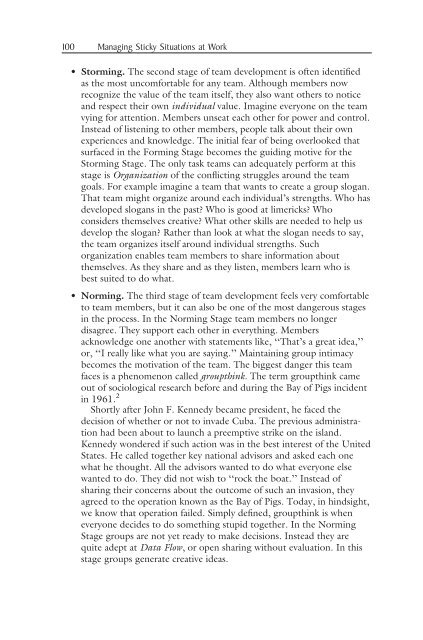Managing Sticky Situations at Work
Managing Sticky Situations at Work
Managing Sticky Situations at Work
Create successful ePaper yourself
Turn your PDF publications into a flip-book with our unique Google optimized e-Paper software.
100 <strong>Managing</strong> <strong>Sticky</strong> <strong>Situ<strong>at</strong>ions</strong> <strong>at</strong> <strong>Work</strong>• Storming. The second stage of team development is often identifiedas the most uncomfortable for any team. Although members nowrecognize the value of the team itself, they also want others to noticeand respect their own individual value. Imagine everyone on the teamvying for <strong>at</strong>tention. Members unse<strong>at</strong> each other for power and control.Instead of listening to other members, people talk about their ownexperiences and knowledge. The initial fear of being overlooked th<strong>at</strong>surfaced in the Forming Stage becomes the guiding motive for theStorming Stage. The only task teams can adequ<strong>at</strong>ely perform <strong>at</strong> thisstage is Organiz<strong>at</strong>ion of the conflicting struggles around the teamgoals. For example imagine a team th<strong>at</strong> wants to cre<strong>at</strong>e a group slogan.Th<strong>at</strong> team might organize around each individual’s strengths. Who hasdeveloped slogans in the past? Who is good <strong>at</strong> limericks? Whoconsiders themselves cre<strong>at</strong>ive? Wh<strong>at</strong> other skills are needed to help usdevelop the slogan? R<strong>at</strong>her than look <strong>at</strong> wh<strong>at</strong> the slogan needs to say,the team organizes itself around individual strengths. Suchorganiz<strong>at</strong>ion enables team members to share inform<strong>at</strong>ion aboutthemselves. As they share and as they listen, members learn who isbest suited to do wh<strong>at</strong>.• Norming. The third stage of team development feels very comfortableto team members, but it can also be one of the most dangerous stagesin the process. In the Norming Stage team members no longerdisagree. They support each other in everything. Membersacknowledge one another with st<strong>at</strong>ements like, ‘‘Th<strong>at</strong>’s a gre<strong>at</strong> idea,’’or, ‘‘I really like wh<strong>at</strong> you are saying.’’ Maintaining group intimacybecomes the motiv<strong>at</strong>ion of the team. The biggest danger this teamfaces is a phenomenon called groupthink. The term groupthink cameout of sociological research before and during the Bay of Pigs incidentin 1961. 2Shortly after John F. Kennedy became president, he faced thedecision of whether or not to invade Cuba. The previous administr<strong>at</strong>ionhad been about to launch a preemptive strike on the island.Kennedy wondered if such action was in the best interest of the UnitedSt<strong>at</strong>es. He called together key n<strong>at</strong>ional advisors and asked each onewh<strong>at</strong> he thought. All the advisors wanted to do wh<strong>at</strong> everyone elsewanted to do. They did not wish to ‘‘rock the bo<strong>at</strong>.’’ Instead ofsharing their concerns about the outcome of such an invasion, theyagreed to the oper<strong>at</strong>ion known as the Bay of Pigs. Today, in hindsight,we know th<strong>at</strong> oper<strong>at</strong>ion failed. Simply defined, groupthink is wheneveryone decides to do something stupid together. In the NormingStage groups are not yet ready to make decisions. Instead they arequite adept <strong>at</strong> D<strong>at</strong>a Flow, or open sharing without evalu<strong>at</strong>ion. In thisstage groups gener<strong>at</strong>e cre<strong>at</strong>ive ideas.















